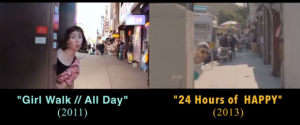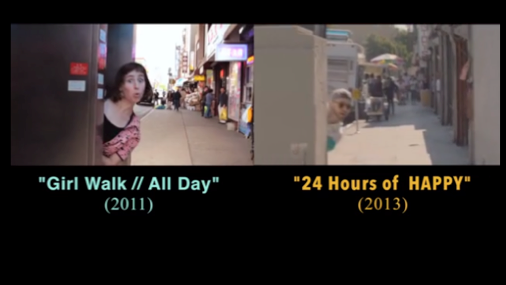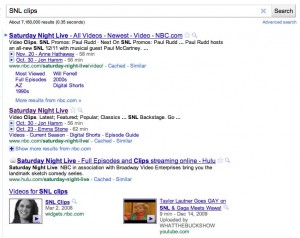 I try to be fairly objective on this blog, but I really have no sympathy for whining photographers that hire attorneys because their photos appear for a second in a popular YouTube video. The photographers, like the writers striking, are under the delusion that they’re being deprived of their rightful income. The reality is that there is no damned income.
I try to be fairly objective on this blog, but I really have no sympathy for whining photographers that hire attorneys because their photos appear for a second in a popular YouTube video. The photographers, like the writers striking, are under the delusion that they’re being deprived of their rightful income. The reality is that there is no damned income.
It’s like a feuding family competing for the box of molded National Geographic magazines their dead father left behind.
Background: “Here Comes Another Bubble,” by “The Richter Scales,” is a case study in copyright lunacy. The penniless a Capella singers stitched their song to random photos they found on the web… because a YouTube music video with a black screen (or worse yet, facially-challenged a Capella singers) just wouldn’t have been as viral. They received no advertising revenue because they weren’t yet in YouTube’s partner’s program (if they were, they would have known the risk, because YouTube puts us through a daunting meeting with an attorney before we get into the program).
Along comes photographer Lane Hartwell (whose image above is used without her permission) and sends YouTube a DMCA notice because she finds one of her photos in the montage.
- Explains Richter Scales: “when Lane emailed us shortly after the video was released, we immediately gave her a credit, with a link, in the “About This Video” section on YouTube, but weren’t able to assess whether that was sufficient because Lane wouldn’t talk to us via phone and didn’t respond to our emails with any requests or proposals before she issued the DMCA take-down request.”
- Fartwell’s attorney claims The Richter Scales were cavalier, and Hartwell herself said: “the band opted not to work with me toward a fair resolution of the issue. I have to say that I’m very disappointed with the members of the band I negotiated with in good faith.”
- This appears to be a divided issue, but isn’t it amazing how radically different these accounts are of what happened before the DMCA notice was filed by Hartwell?
Lane’s attorney friend is sympathetic but acknowledges she has little legal recourse. So what it this about? Standing for principals or fame whoring? I’ve got my theory. (Parenthetically, here’s an article on this subject from Wired, but don’t expect objectivity since Fartwell contributes to the publication).
Now this stupid thing is a debate of magnitude proportions:
How about you photographers save your energy for when someone is actually making money on your images instead of doing it on principle? Or find a way to put your talents to making your own profit, instead of whining when someone else uses your photos to not make money. There’s no mistaking that the a Capella group violated Hartwell’s copyright, but it’s not like they were out selling her framed photos to line their limos with puppy fur… they didn’t make any money directly from the viral video, and to date have sold a few of their legacy music CDs that don’t even contain the “Here Comes Another Bubble” song.
Here’s the essence of the problem. It’s a good motive gone perverse. Photographers, video creators and a Capella singers are all in the same boat. We’re artists who are not generally making significant dollars via our passion, and so we want to preserve our rights. But do we chase each other down for our fair share of dink, or find ways to collaborate and monetize?
My videos are constantly ripped and posted. Sometimes I’ll alert YouTube, but I usually consider it free advertising. The only time I ever took objection is when someone posted my “Bored at the Mall” on Break.com and made profit from it as it hit ~1.5 million views. But I didn’t go on a witch hunt and didn’t expect to get a dime.
If creators instead invest the time they spend whining about copyrights in promoting their work and monetizing it, things will change. And the only ones who will suffer in that scenario are ambulance-chasing copyright attorneys.
Thanks to NewTeeVee for getting me all riled up before my second cup of coffee. By way of disclaimer, I have no relationship with The Richter Scales and I’m a strong believer in artist rights — hence my passion for models like Revver. But I have zero tolerance for unreasonable behavior like this.
Hey, Lane. If you’ll drop this, I will personally send you a check for their entire proceeds of 8 CDs. But if not, please have fun filing DMCA notices against those strangers that participate in my “Lane Hartwell Video Collage contest” using your Flickr photos (See my video rant).





